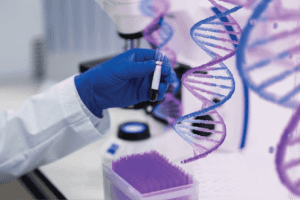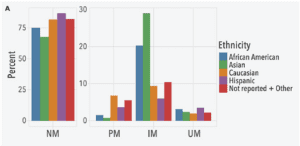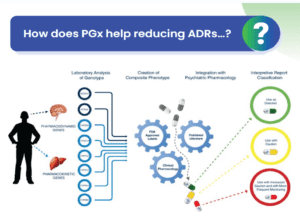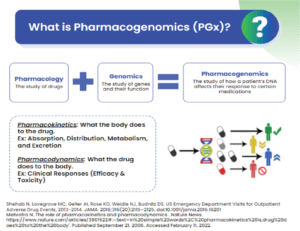
In a recent enlightening webinar organized by Health Wealth Safe featuring Dr. Subodh Agrawal and Dr. Ruben Bonilla Guerrero, the spotlight was on the topic of Personalized Medication. In this article, we’ll delve into the crucial information shared by the experts in the webinar.

In our enlightening webinar, with the help of our expert speakers, we explored the transformative potential of gene testing, emphasizing the pivotal role of the patient-provider relationship in delivering optimal care with the help. In the webinar Our passionate speaker underscored the vital role of the patient-provider relationship, urging healthcare providers to consider genetic makeup when prescribing medications.
Gene testing isn’t just about decoding DNA; it’s about revolutionizing medication. Our speaker sheds light on the collaboration between laboratories and knowledge databases, creating reports that empower healthcare providers with precise information. This report, organized alphabetically, covers therapeutic areas, medication classes, and mechanical actions, facilitating informed decisions.

While AI streamlines options, our speaker emphasized the irreplaceable role of provider knowledge and patient interaction in crafting the perfect treatment plan.
Gene Testing provides essential information on medications, including generic and commercial names, associations with genes, impact on patients, and more. Accessible through electronic records, this report ensures informed decision-making and can be shared securely through provider portals.
In a world of soaring healthcare costs, gene testing emerges as a cost-effective hero. Compared to potential hospitalization expenses, it’s a pocket-friendly option, often covered by Medicare and commercial payers.
Dr. Ruben Bonia Guerrero is a key figure in the development of a program that uses gene testing to help patients find the right medications for their unique genetic profile. His mission is to ensure that more people benefit from this groundbreaking approach to healthcare.

Pharmacogenomics Explained: The program utilizes a test known as PGX (Pharmacogenomics) to delve into a patient’s genetic makeup. It reveals how their body processes medications. This is a game-changer as it offers insights into the effectiveness of medications.
Cyp2d6: The Key Enzyme: The cyp2d6 enzyme, responsible for metabolizing a large percentage of medications, takes center stage. Patients are categorized as “normal metabolizers,” “poor metabolizers,” “intermediate metabolizers,” or “ultra-rapid metabolizers.” This information shapes medication choices.
Preventing Medication Failure: One of the primary goals of this program is to help patients understand which medications work best for their unique genetic composition. It eliminates the risk of medication failure and its associated consequences.
Pharmacogenomics (PGX) is a game-changer in healthcare, significantly reducing the risk of adverse drug reactions (ADRs). This powerful approach analyzes various genes and non-genetic factors to gauge a patient’s potential drug response.

Customized Medication Selection: PGX offers healthcare providers critical information about which medications are most likely to work for a specific patient, those that require caution, and those that should be avoided. This tailored approach reduces the risk of adverse reactions.
Understanding Patient Factors: PGX goes beyond genetics, taking into account other essential factors such as organ function, age, concomitant medications, and even dietary interactions. It’s a holistic approach to medication selection.

Genotyping is the gateway to understanding how genetic variants influence medication metabolism. It involves different forms of analysis, such as whole exome analysis and whole genome analysis. This method helps determine how a person’s unique genetic composition impacts medication effectiveness.
Comprehensive Medication Testing: A wide range of medications can be tested using genotyping. It’s an approach that has the potential to transform medication regimens, offering improved effectiveness and safety.
Consult Your Healthcare Provider: While genotyping holds great promise, it’s essential to consult your healthcare provider and reputable laboratories to make informed decisions about your medications. This partnership ensures that you receive the best care possible.

The path to personalized medication is not without its challenges. Making these services accessible, inexpensive, secure, and efficient when needed is one of the main obstacles. It demands a multifaceted strategy.
Team Support: Proper team support for healthcare providers is vital. Managing safe medication involves a collective effort. To make sure that patients receive the best treatment possible, medical professionals must collaborate well.
Education is Key: Education plays a pivotal role in the successful implementation of pharmacogenomic testing. Healthcare providers and patients alike must be informed about the process and its significance.
Institutional Responsibility: Various institutions, including medical schools, educational organizations, professional bodies, laboratories, and healthcare providers, share the responsibility of educating others about the proper use of pharmacogenomic testing. It’s a collective effort to drive change.
Not all pharmacogenomic tests are created equal. The quality of testing can vary depending on the laboratory and the genes analyzed. Regulatory agencies are working tirelessly to establish professional guidelines to ensure tests are safe and reliable.
The Example of GST1: Specific genes, like GST1, which impacts the metabolism of certain medications, highlight the need for consistency in testing. Taking a PGX test for this gene can provide valuable information that guides medication decision.
Statin medications are commonly prescribed for cholesterol reduction, but they can lead to side effects such as muscle pain, myopathy, and muscle breakdown in some patients. The genetic component of medication response is crucial in this context.
Customizing Treatment: Approximately 39 million individuals take Statin medications, with a significant portion at risk of side effects due to their genetic makeup. Customizing treatment based on genetic information can reduce these risks.
Focusing on Individual Genes: Rather than a one-size-fits-all approach, pharmacogenomic testing examines the relationship between specific genes and medications, leading to tailored treatment plans.
In a rapidly evolving field of healthcare, personalized medication stands at the forefront, poised to revolutionize how we approach treatment. From telemonitoring services that empower patients to gene testing that reveals our unique genetic makeup, the future of healthcare is becoming increasingly personalized. It’s a future where safety, effectiveness, and cost-efficiency reign supreme. As we overcome barriers and expand our knowledge, a healthier, safer future awaits us all. Embrace the power of personalized medication, and unlock a brighter tomorrow for healthcare.
Become a Partner
Support
Portals